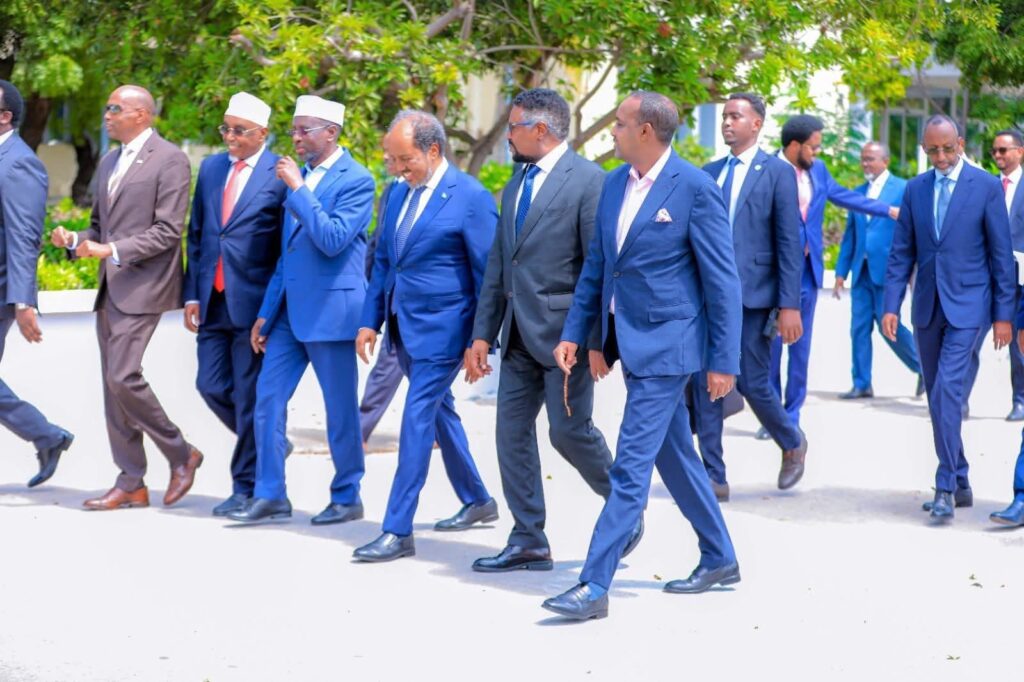All eyes are fixed on Villa Somalia this Wednesday as Somalia’s President Hassan Sheikh Mohamud meets with leaders of the Opposition Salvation Forum in a highly anticipated political dialogue. What unfolds behind closed doors today could either open the path toward national consensus or become yet another symbolic gesture in a nation where political talks too often end in stalemates and recrimination.
The meeting, initially agreed upon during a previous encounter at the Presidential Palace, comes at a moment of heightened tension and distrust. In the brief span of three days since that last meeting, the political landscape has shifted, some would say unraveled. President Hassan Sheikh’s decision to register for the controversial “one person, one vote” election in the Warta Nabadda district was seen by the opposition not just as a routine political act, but as a calculated move that threatened to pre-empt any genuine negotiation.
To his critics, it signaled that the president has already chosen a path forward, one that excludes real compromise.
What began as a cautious process of negotiation took a sharp turn on Tuesday night when the joint committee tasked with drafting a common communiqué collapsed. Sources close to the talks say the breakdown was triggered by the Palace delegation introducing new demands that had not been part of previous discussions. This maneuver, viewed by the opposition as an act of bad faith, threw the entire process into disarray and forced the urgent scheduling of a new preliminary meeting before today’s main event. The very infrastructure meant to build trust between the two sides now risks reinforcing the perception that the talks are hollow-staged performances rather than meaningful engagement.
Compounding the dysfunction is a glaring division within the opposition itself. While the Salvation Forum may present a united front in terms of physical presence, ideological and strategic fractures have become increasingly evident. The central dispute lies in how to handle Article 4 of the Provisional Constitution, whose recent amendments by Parliament have sparked widespread controversy. A faction within the opposition insists on nothing short of full revocation and a return to the 2012 version of the Article, which outlines the structure of the country’s electoral framework. Others, however, argue for a more pragmatic approach—acknowledging the reality of the amended text and seeking a revised consensus.
This internal discord not only weakens the Forum’s negotiating position, but also plays directly into President Hassan’s hands.
According to multiple reports, including from Somali Stream, the President has quietly begun distancing himself from the Forum, opting instead to engage with more pliable political actors who might offer support without demanding significant concessions. The fragmentation of the opposition provides Villa Somalia an opening to push its own agenda while claiming openness to dialogue.
Yet the President, too, is walking a dangerous tightrope. On one hand, he has assured his party, the Justice and Solidarity Party (JSP) and allied regional administrations that no constitutional changes will proceed without full consensus. On the other, he told the opposition just days ago that he was willing to suspend the implementation of Article 4 entirely.
This dual messaging has not gone unnoticed. It raises serious concerns about the President’s sincerity and whether he is genuinely interested in compromise or merely managing dissent through calculated ambiguity. His critics argue that this strategy which involves trying to appease both allies and opponents without truly committing to either—may soon collapse under its own contradictions.
Nowhere is the lack of trust more visible than in the reaction to the President’s election registration. While supporters see it as a leadership gesture , demonstrating commitment to a democratic process long promised opponents interpret it as an authoritarian move.
To them, it signals a government willing to use the façade of reform while consolidating power under the guise of “electoral modernization.” More significantly, it sends a clear message: while talks are happening, decisions are already being made.
The agenda for Wednesday’s meeting is nominally centered on finding consensus and building a framework for moving forward. However, much of the focus is expected to fall on the language of a final joint statement; if one can be agreed upon at all.
Villa Somalia is reportedly pushing for a statement that simply states Article 4 has been “returned to Parliament for reconsideration,” an intentionally vague phrase that would allow the government to buy time without making substantive concessions. In contrast, the opposition is demanding explicit clarity: they want the statement to declare that the amendments to Article 4 have been formally withdrawn and nullified. For both sides, these aren’t just words, they’re markers of political victory or retreat.
The stakes, then, are immense. With the 2026 elections on the horizon and mounting international scrutiny over Somalia’s democratic trajectory, the outcome of today’s meeting could shape the future of the country’s governance model. For the President, this is a test of his ability to navigate competing constituencies without alienating them entirely. For the opposition, it’s a test of relevance and unity in the face of political marginalization.
For the Somali people, watching anxiously from the sidelines, it is yet another moment of waiting while hoping that this meeting might lead to something more than another press release destined to fade from memory.
If there is a glimmer of hope, it lies in the recognition by both sides however grudging, that the current political impasse cannot hold. The danger of political fragmentation, rising public distrust, and potential regional destabilization looms too large. Today’s meeting could serve as a reset button, an opportunity to recommit to dialogue that is substantive rather than symbolic. But if history is any guide, expectations should be tempered. Somalia’s political road is littered with missed opportunities dressed up as progress.
The window for credible consensus is narrowing. What happens today may not resolve all divisions, but it will almost certainly define whether those in power are ready to face the country’s challenges together or continue down parallel tracks, hurtling toward confrontation masked as consultation.


